Some of the women and girls at ACWES 2024 held in Kigali
The African Conference of Women Engineers and Scientists 2024 (ACWES 2024) has shown that the gender gap in uptake of sciences among females is still wide despite existing talent and potential among young girls.
The conference held in Kigali from November 5-7, 2024 aims to attract and retain women in Science, Technology, Engineering, and Mathematics (STEM), serving as a catalyst for Africa’s sustainable development.
ACWES 2024 also intended to focus on empowering women in STEM fields working in industry, NGO, academia, research, to foster gender equality and addressing societal challenges.
The conference reported that women in STEM fields are underrepresented with only 30% in related careers and 31% in research and development roles in the Sub-Saharan Africa region.
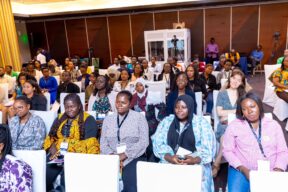
Using the UNESCO reports, the president of the Rwanda Association for Women in Science and Engineering (RAWISE) Dr. Marie Chantal Cyulinyana, indicated that most women in education don’t reach the PhD level and this is also seen in other areas of life and leadership.
“Many leave the STEM fields at key transition points, such as from education to industry due to systematic challenges,” Cyulinyana said.
For example, the report showed that out of the 53 bachelors students only 28 reach the research and development level as many drop out in a leaky pipe effect.
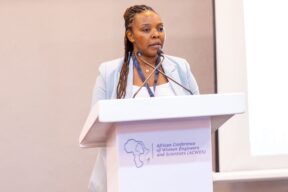
Dr. Marie Chantal Cyulinyana
Though many African countries have invested in education and training of girls in STEM (at grassroots levels) Cyulinyana stated that the reasons behind these disparities or low representation in STEM fields is caused by existing gender norms and discrimination, on and offline bullying, discriminatory practices, lack of active role models and less internet connectivity and access.
“These challenges are of great concern as they contribute to a vicious cycle that perpetuates disparity, reinforcing gender stereotypes, and discrimination especially in environments where there are no policies supporting women,” Cyulinyana said.
To overcome these gaps, there is a need for women to participate in economic activities, entrepreneurship, access education and leadership and establishment of policy briefs that can act as a guide.
She also laid a call to action to intentional recruitment and support women in leadership roles, create inclusive workplace cultures, and earlier exposure through mentorship activities.
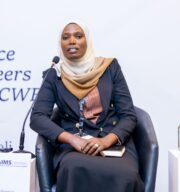
Dr. Zeubeda Ukundimana
Dr. Zeubeda Ukundimana, a lecturer at University of Rwanda has gone through these challenges, however managed to beat them despite coming from a poor, polygamous family of 20 children, she currently holds a PhD and Master in environmental and chemical engineering respectively.
From the whole family she became the only child to complete primary school and got a scholarship to a good school thanks to the government that supports girl education.
“My passion was education but I was sent to study STEM. My heart was full of fear because of the stereotypes that girls cannot understand physics, but I had a determination to save my family. That is how I managed to work double time,” Ukundimana said.
With her excellent performance she was offered a government scholarship to pursue a bachelors and masters in Algeria and later a PhD.
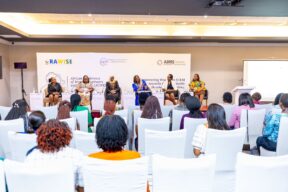
Dr. Zeubeda Ukundimana(3rd left) is one of the women scientists in Rwanda who have overcome gender barriers
Dr. Nelly Adjoa Sakyi-Hagan, the chairperson of ACWES said that the conference will be a platform for change and establishing networks that will drive the organization and women towards being represented in decision-making positions that shape the continent’s future.
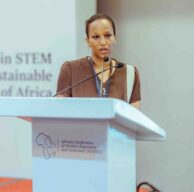
Janet Umuhoza, a Climate Scientist at GIZ Rwanda, who trained in China shares her education journey to inspire others in STEM
African Institute for Mathematical Sciences (AIMS) Network President, Prof. Sam Yala, said that the Pan-African network of centres of excellence enabling Africa’s talented students to become innovators driving the continent’s scientific, educational and economic self-sufficiency has managed to achieve a milestone of graduating 37% completing Master’s programs at the centre in Rwanda and the journey needs more work to increase to 50% in all six centres across Africa.
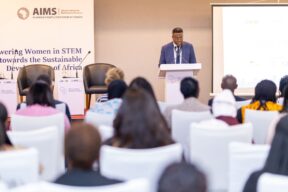
Prof. Sam Yala making a committment to support young women in STEM
Yala said that “AIMS is committed to creating an inclusive environment that nurtures young female talents (in STEM) by empowering these young minds, we are not only investing in their future but also the future of the continent,” Yala said.
The conference will continue through this Thursday with several panel discussions and scientific papers presentation that will ultimately inspire girls attending the hybrid conference from across Africa.
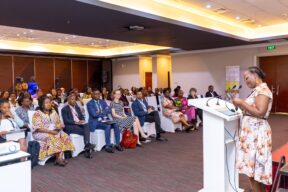
This post was originally published on here






